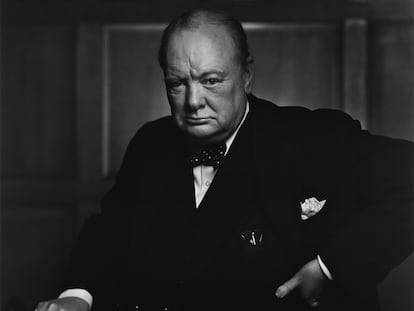Famous Winston Churchill portrait stolen from a Canada hotel is found in Italy after two-year hunt
A fake of the ‘Roaring Lion’ hung in its place for eight months in the lobby of the landmark Château Laurier in Ottawa before employees noticed the switch

Authorities have tracked down The Roaring Lion, the most famous portrait of Sir Winston Churchill, stolen more than two and a half years ago from a landmark hotel in Ottawa, the capital of Canada. The iconic image of the British statesman, taken in 1941 by the photographer Yousuf Karsh, has been located in Italy.
The police said the photograph had been “sold to an Italian buyer through a London auction house,” adding that “both parties were unaware that it was a stolen work” as the theft had not yet been reported. Two investigators will travel to Rome in the coming days to collect the portrait and return it to the managers of the Fairmont Château Laurier hotel.
The famous photograph was reported missing in August 2022. But the heist took place before that: it has emerged that a fake had been hanging in its place for eight months without anybody noticing.
A 43-year-old man from Powassan, in Ontario province, was arrested on April 25 and charged with multiple offenses, including theft, forgery and trafficking in stolen property, the CBC reported. According to a police source consulted by the network, “details about the painting’s recovery have not been released until now due to the necessary diplomacy required in an international case.”
The famous work had been on display since 1998 inside the lobby of the Fairmont Château Laurier hotel, a massive 660,000-square-foot building with 429 guest rooms that is a national landmark in Canada. The switch was noticed and reported to the police in August 2022, when hotel employees realized that the frame around the photograph was different. But the theft appears to have taken place between December 25, 2021, and January 6, 2022, during a Covid-related lockdown in Ottawa. Establishing the date of the heist was made possible partly by comparing photographs sent in by hotel guests who had taken selfies in front of the picture.
Ottawa police said that thanks to information sent in by the public, forensic analysis and cooperation with law enforcement agencies in other countries, particularly the London police, they were able to track down the perpetrator of the theft, whose name is under a publication ban.
The photograph was taken on December 30, 1941, after the British prime minister had given a speech to Canadian members of parliament to thank them for the country’s war efforts against Nazism. In addition to being published on the cover of Life magazine, the photograph has appeared on the back of the five-pound banknote since 2016.
Yousuf Karsh was a star in his own right. In a career spanning several decades, his lens captured other leading 20th-century figures such as Pablo Picasso, Indira Gandhi, Muhammad Ali, Queen Elizabeth II and Ernest Hemingway. Of Armenian descent, Karsh arrived in Canada in 1924 at the age of 16, and died in Boston in 2002.
The photographer, who personally donated the Churchill photograph to the hotel, lived in one of its rooms for nearly 18 years. Hotel management said it will increase its security measures when it puts the item back on display.
Sign up for our weekly newsletter to get more English-language news coverage from EL PAÍS USA Edition
Tu suscripción se está usando en otro dispositivo
¿Quieres añadir otro usuario a tu suscripción?
Si continúas leyendo en este dispositivo, no se podrá leer en el otro.
FlechaTu suscripción se está usando en otro dispositivo y solo puedes acceder a EL PAÍS desde un dispositivo a la vez.
Si quieres compartir tu cuenta, cambia tu suscripción a la modalidad Premium, así podrás añadir otro usuario. Cada uno accederá con su propia cuenta de email, lo que os permitirá personalizar vuestra experiencia en EL PAÍS.
¿Tienes una suscripción de empresa? Accede aquí para contratar más cuentas.
En el caso de no saber quién está usando tu cuenta, te recomendamos cambiar tu contraseña aquí.
Si decides continuar compartiendo tu cuenta, este mensaje se mostrará en tu dispositivo y en el de la otra persona que está usando tu cuenta de forma indefinida, afectando a tu experiencia de lectura. Puedes consultar aquí los términos y condiciones de la suscripción digital.








































